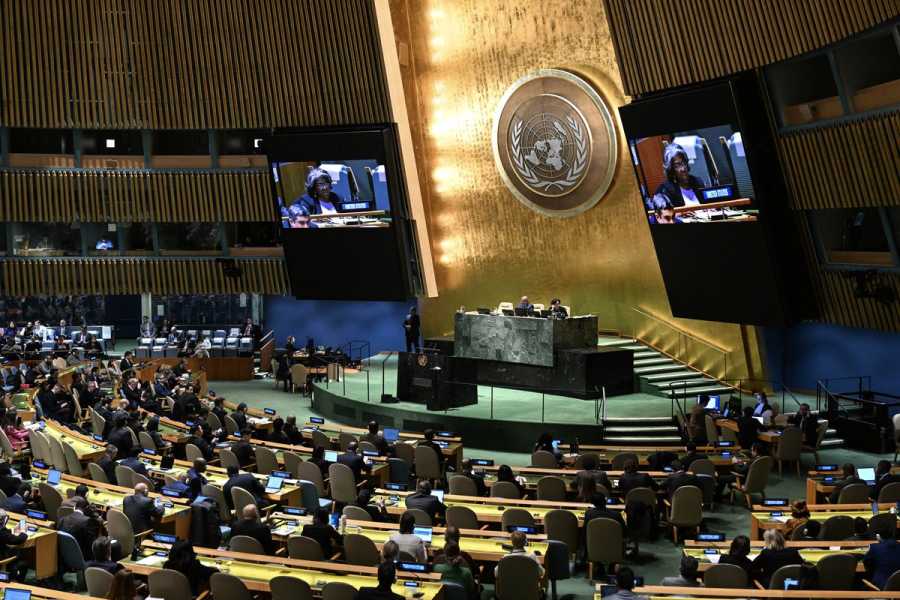Why the US and Israel are becoming “increasingly isolated.”

United States Ambassador to the United Nations Linda Thomas-Greenfield makes a speech at the UN General Assembly in New York, which overwhelmingly adopted a draft resolution demanding an immediate humanitarian ceasefire in Gaza on December 12, 2023. Fatih Aktas/Anadolu/Getty Images Li Zhou is a politics reporter at Vox, where she covers Congress and elections. Previously, she was a tech policy reporter at Politico and an editorial fellow at the Atlantic.
The international community is increasingly turning against Israel’s ongoing military onslaught in Gaza, in large part due to a growing civilian death toll and humanitarian crisis. That’s putting new pressure on Israel’s government and its closest ally, the US, which is supplying and backing the Israeli offensive.
This change has been evident in the last few weeks as global support for a ceasefire has grown, and as US public opinion has also moved in that direction. A UN vote this week highlighted the shift: 153 countries in the body’s General Assembly, the overwhelming majority, voted in favor of an immediate humanitarian ceasefire. That’s an uptick from October, when 121 countries in the General Assembly similarly backed a humanitarian truce. Notably, US allies Canada, Australia, and Japan were among the countries that voted in the affirmative this week after abstaining in October. The US, meanwhile, was one of a handful of countries to oppose the ceasefire resolution, while some of its other allies, including Germany and the United Kingdom, abstained.
“As this continues over the next few weeks, you’re going to see even greater distance between the US and its allies, and the US and Israel increasingly isolated,” says Osamah Khalil, the chair of international relations at Syracuse University.
Because the Israeli government views the fight with Hamas as an existential one, however, shifts in global opinion aren’t expected to compel it to change course. Similarly, experts expect the US — which has long been one of Israel’s closest allies and sources of military aid — to maintain its staunch support due to the longstanding relationship between the two and its own interests in the region.
US President Joe Biden has begun moderating his tone on Israel in recent weeks, but changes to the US’s position on the war have been largely rhetorical for now. As long as Israel has US backing, the growing global pushback it faces isn’t poised to have a material impact on its ongoing military campaign, experts say.
“Only the United States can exert pressure on Israel, either by threatening to vote for or abstain on a call by the [UN] Security Council for a ceasefire, or by threatening to reduce or end its material support for the Israeli offensive,” says UCLA Middle Eastern history professor James Gelvin. Thus far, the US has not been interested in taking such steps, allowing Israel to continue its wartime policies without needing to take into account the critiques it’s fielding from other countries.
The impact of changing global support
The global concerns about the Israeli offensive in Gaza, which have been expressed by aid organizations, the UN, and a number of countries, are contributing to how the US is framing its backing of Israel, though they aren’t yet affecting its actions.
“The US government is more sensitive to global public opinion, which is why you are starting to see a shift in the Biden administration’s public statements,” says Steven Cook, a fellow at the Council for Foreign Relations. “It seems to be mostly rhetoric, however. There is no substantive change.”
Biden himself has cited flagging support for Israel in recent remarks.
When speaking to donors at a December 12 fundraising event, Biden said that Israel is “starting to lose that support” from global allies due to “indiscriminate bombing that takes place.” Similarly, US officials have warned that the country would need to take more action to reduce civilian casualties, and that it could lose further public backing if it failed to do so.
Civilian casualties are growing rapidly in Gaza as Israel responds to the attack launched by Hamas on October 7. That day, Hamas killed about 1,200 people and took more than 200 hostages. In the immediate weeks following the attack, many Western countries rallied to back Israel, with five of the seven G7 countries issuing a statement expressing “steadfast and united support” for the state of Israel. I wasn’t able to load (Four of those five countries — Germany, France, Italy, and the UK — either abstained from or supported the vote on the UN ceasefire resolution this week.)
Since the Hamas attack, the airstrikes and ground offensive Israel launched in Gaza in response have killed at least 18,600 people, most of whom are civilians, according to the Gaza Health Ministry. And Israel’s blockade of Gaza — which has severely limited the availability of food, water, fuel, and medicine — has created a humanitarian disaster the UN has called “apocalyptic.” The offensive has led to mass internal displacement and has forced civilians to evacuate to overcrowded and uninhabitable “safe zones.”
According to the Los Angeles Times, there’s been some private fracturing between the US and Israel on the preferred approaches to tactics and strategy in the war, some of which has been driven by global outcry. Additionally, some progressives have urged the Biden administration to condition military aid on the fulfillment of humanitarian measures. The administration hasn’t backed that plan, but it has pressured Israel to ensure evacuations that reduce civilian casualties and to discuss a different postwar vision that could include a two-state solution.
At this point, any push for either country to alter its policies is more likely to come from domestic pressures than it is from global ones, foreign policy experts say.
Israeli officials, including Israel UN Ambassador Gilad Erdan, have emphasized that the country views a ceasefire as ensuring the “survival of Hamas,” which Israeli forces are intent on eradicating.
“The political environment in Israel is very much akin to the political environment in the United States after 9/11,” says William Wechsler, the senior director of the Rafik Hariri Center and Middle East programs at the Atlantic Council, who notes that this means it’s unlikely the country would pause its military actions just two months after the October 7 attack. Public opinion polls also show that the Israeli public overwhelmingly supports the military actions its government is taking in Gaza.
And Prime Minister Benjamin Netanyahu has emphasized this position in response to the international backlash. “We are continuing until the end, there is no question,” he said on Wednesday, December 13.
In the US, Biden is dealing with pressure from his own party — which is divided on the issue of military support for Israel — and the growing backing of a ceasefire domestically: According to a December Data for Progress poll, 61 percent of likely US voters support a ceasefire in Gaza. At the same time, December polling from YouGov/CBS News has found that most Americans — 69 percent — feel Biden has shown either the right amount of support for Israel or too little support for Israel. These surveys, and others like them, reveal Biden is juggling a wide array of public opinion on the matter. With an upcoming election in 2024, those forces are likely weighing on how Biden and the administration approach this issue, though they’ve not yet significantly altered the US’s position.
Sourse: vox.com






